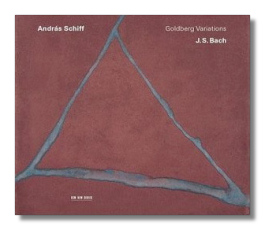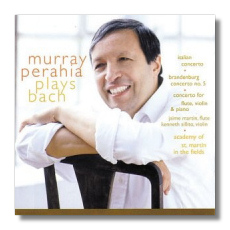
The Internet's Premier Classical Music Source
Related Links
- J.S. Bach Reviews
- Latest Reviews
- More Reviews
-
By Composer
-
Collections
DVD & Blu-ray
Books
Concert Reviews
Articles/Interviews
Software
Audio
Search Amazon
Recommended Links
Site News
 CD Review
CD Review
Johann Sebastian Bach

- Goldberg Variations, BWV 988
András Schiff, piano
ECM New Series ECM 1825 DDD 71:13


- Concerto in A minor for Flute, Violin & Keyboard, BWV 1044
- Brandenburg Concerto #5 in D Major, BWV 1055
- Italian Concerto in F Major, BWV 971
Murray Perahia, piano
Kenneth Sillito, violin
Jaime Martin, flute
Academy of St. Martin-in-the-Fields/Murray Perahia
Sony Classical SK87326 DDD 55:22
This is Schiff's second (at least) go at the Goldbergs. (The earlier Decca recording has been reissued in the mid-priced Penguin series on 466214-2). This time around, Schiff has been recorded in concert at the Stadtcasino in Basel, Switzerland on October 30, 2001.
Schiff takes every repeat, modestly embellishing some of the repeats, and yet the 71 minutes fly past. He is unapologetic about playing this music on the piano – while complaining that arrangements for non-keyboard instruments are "silly"! - and he calls up seemingly unlimited resources of tone color, dynamic gradations, and pedaling. Rather than emphasizing the work's contrasts, he maintains a grand expressive line that binds each variation to its predecessor and successor. Most performers play some of the variations – the penultimate one, for example – more quickly than I think they would have been played in Bach's time, and almost certainly faster than Goldberg himself would have played them. (Remember, Goldberg was supposed to have been entertaining an insomniac employer, and helping him to pass the long, sleepless hours.) The outcome is fiendishly brilliant, but it sounds un-Bachlike. One questions whether this is an artistic decision or an economic one: to play all the variations at what I would consider an authentic tempo, two CDs would be required, and neither record companies nor the average purchaser want the extra expense. (Exceptions include Rosalyn Tureck on Deutsche Grammophon and Jory Víníkour on Delos.) Nevertheless, Schiff's newest reading has plenty of integrity, excitement, and both intellectual and tonal allure. This release is made even more attractive by the inclusion of extensive booklet notes, including a variation-by-variation appreciation by the performer himself. The engineering is excellent, and the presence of an audience adds atmosphere without adding outright noise; coughs, etc., do not interrupt the performance.
Having recorded the seven canonical keyboard concertos on two earlier Sony Classical CDs (SK89690 and SK89245, also with the Academy of St. Martin-in-the-Fields), Perahia ties up a few loose ends with this most recent release, which also has been warmly recorded. Like Schiff, Perahia doesn't apologize for using the "inauthentic" piano in this music. Instead, he takes advantage of its potential for expression, which is (let's face it) greater than that of the harpsichord. Perahia is "historically aware" without being tied down by the requirements that scholars of Baroque music might impose on him. Using reasonable tempos, he emphasizes the singing character of Bach's music, even at its most heterophonic. This, then, is Bach without intimidation – less structurally obvious than some, and more linear than vertical. I hope that Perahia will continue to record Bach's solo keyboard works, as his earlier efforts have been gratifying, and many great pianists in recent times have been scared away from this music, it seems, by the "original instruments" bullies.
Copyright © 2004, Raymond Tuttle




















